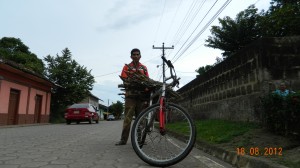
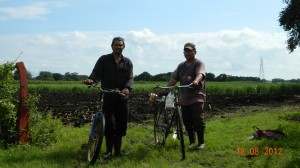
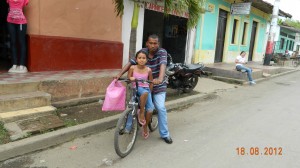



A Peace Corps Volunteer Brings more than Good Will to an Island School
by Patricia Hamill
Winter 2011 InGear
As you may have read on our web site, we received a wonderful letter from Peace Corps volunteer Liz Deppe thanking us for making it possible for the school where she teaches to acquire 20 sewing machines. Located on the island of St. Vincent, the Barrouallie Secondary School (BSS) is the fortunate institution to welcome Liz and, hence, receive the machines. Originally from Ames, Iowa, Liz has only been in St. Vincent for 8 months as an assistant to the teachers in the art and reading courses; however, in that short time, she has made an enormous difference. Having known about P4P from our work in Iowa, she decided to contact us about donations of sewing machines to incorporate into the curriculum.
What can they do for employment without this skill? While banana production has dominated the economy, the government has been seeking ways of diversifying so that Vincentians do not continue to be vulnerable to price fluctuations and crop diseases. Tourism is an industry that has grown widely, but not everyone is able to profit from this type of expansion. This is where the importance of a solid education backed up by practical vocational skills comes into our story. According to Liz, “That first project and many more projects the students at BSS will work on are teaching them more than just how to sew. They are learning patience, creativity, problem-solving skills and a sense of accomplishment.”
While the machines are not used for production but strictly for classroom learning, there is hope that more machines can be acquired so that families may be able to purchase them and begin their own businesses. At the very least, the students have a marketable skill to offer alongside the knowledge they gain from their studies. Liz has witnessed firsthand the lasting effect that tangible results from focused effort provide: “What I believe is the most rewarding part of our newly created sewing program is a sense of accomplishment. At a school with little resources and many struggling students, it is amazing to watch a student who has never felt proud show you what they have accomplished. Their face beams as they hold up the finished product, something they can use and show off.”
It is part of our mission to do the utmost to send our shipments as economically as possible while striving to get the sewing machines and bikes out to those in need as quickly as possible. P4P was able to ensure that the sewing machines could make it to the school and with as little financial burden as possible by sending them via sea rather than air. The cost was demonstrably lower at $10 apiece. If all goes well, we may be able to continue this relationship not only with the school but also expand to other institutions on the island. It is Peace Corps Volunteers like Liz and people like our partners and contributors who think progressively, initiate programs, and give support that make our efforts so successful.
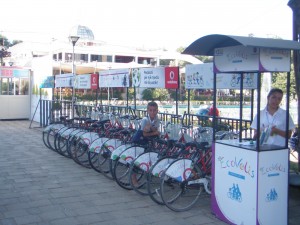
Ecovolis is a bike-sharing system based in Albania’s capital, Tirana. Initiated over two years ago, this program has revolutionized the city’s transportation and circulation scheme. There was a very real necessity to create a solution to the congestion and pollution in the car-filled streets of Tirana, and it is largely due to the donations of bicycles and the great work done by Ecovolis’s strongest partner, Pedals for Progress, that made the program take hold.
Since the first communication with P4P and its president, David Schweidenback, 1,465 bicycles have landed in Albania and they are all currently circulating in its streets. For a country of 3 million people, this is a great first step. Consider the fact that, after a fifty-year communist regime that forbade the personal use of automobiles, the last 20 years saw a surge in ownership of cars. The unfortunate result of this new age of consumption was that Albania became one of the most polluted countries in Europe.
As part of PASS (Programii Alternativave Sociale Stimuluese, Social Stimulating Alternative Programme), which promotes and support environmentally friendly actions, Ecovolis immediately embraced the idea of using recycled bicycles for Tirana’s bike-sharing system rather than purchasing new and potentially costly or unreliable alternatives. This system was presented to its citizens with a strong ecologic and recycling message: “Put used bicycles into good use.” People needed to be conscious of the need to reduce the pollution created by the multitude of cars that circulated in the city streets. P4P was the model we followed.
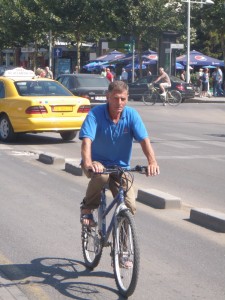
A great part of the bicycles were transformed and painted in order to become identical and be part of the bike-sharing system. However, hundreds of them were also donated to children’s organizations such as Terre des Hommes or orphanages. American efforts and involvement have created smiles on many Albanian children’s faces. Being so grateful to David and P4P, Ecovolis made a point to notify the staff of the U.S. Embassy in Tirana, who couldn’t but feel proud of the generosity and eco-friendly behavior of the people they represent here in Albania.
All in all, the shipments of those bicycles now seen in the streets of Tirana and Durrës and the sewing machines now used by associations of women in need offer a strong and concrete message to the Albanian people: Recycling and cooperating for good causes are what bring about solutions and unite people of distant nations.
Pedals for Progress partners with a wide variety of organizations to promote and aid sustainable economic development throughout the world. One of our partnerships this year was with International Relief & Development (IRD), a NGO with truly global reach that provides $500 million in development assistance in nearly 40 countries annually. Our collaboration with IRD involved a joint program of theirs with the United Nations to aid more than 800 refugee families in Georgia displaced during that country’s 2008 conflict with Russia.
P4P was pleased to be able to help that effort by providing 82 donated sewing machines. The shipment cleared customs in early September and the machines have by now been fully distributed. Our hope is that the sewing machines will in some measure encourage entrepreneurship and return self-sufficiency to families who had been forced from their homes during the fighting and returned to find their belongings stolen or destroyed. Most of the aid was distributed in the Shida Kartli region of central Georgia (just south of contested South Ossetia).
Below is a thank you note forwarded to us by IRD:
“I am Iamze Chutkerashvili, a solitary mother and I am looking after my two sons alone. I am a teacher and my salary is not enough for keeping the family. Without the assistance from non-governmental humanitarian organizations as IRD our life would have been much more difficult.
“I have already received a solid assistance from IRD and I was amazed and very excited when I saw your representative once again in my family with quilts, sewing machine, and sewing kits.
“As you know our village is one of the villages from the former buffer zone and during the war in August 2008 almost every family were damaged and looted, so you can easily understand how important such kind of assistance for me is.
“I want to say once again that all beneficiaries in my village are very thankful to IRD for the assistance.”
As much as we wish it were otherwise, Pedals for Progress simply can’t get the items our domestic supporters donate to all the places in the world where people desperately need a leg up. Partners like IRD help us help those whom it would normally be prohibitively difficult for us to reach alone.
by Patricia Hamill
Summer 2012 InGear
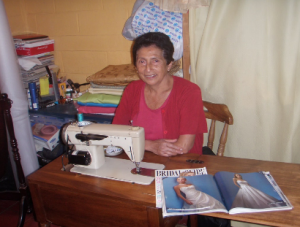
Señora Antonieta Mesa and her sister Señora Irma Mesa were quite welcoming when David and Gary arrived to visit their sewing studios. These ladies clearly each know what market they want to focus on and how to keep their businesses thriving. Señora Irma makes her living by sewing school uniforms and selling to or doing custom work for the middle-class families of the town and she does her best to donate what she can to the poor families who cannot yet earn enough to purchase her clothes. Looking at the dresses made by Señora Antonieta really dispels the idea that only the very poor or unsophisticated are influenced by the outreach work of FIDESMA and P4P.
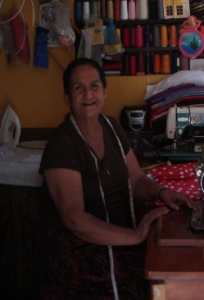
Señora Antonieta originally started her business using cheap plastic machines from an unknown source but, through the micro-credit provided by FIDESMA, she was able to get an older model heavy-duty machine from them. It could sew through thicker layers of more expensive cloth. This advantage enabled her to create the much coveted wedding dresses seen in high-end bridal magazines and the very necessary lovely gowns for young women’s “sweet 15” parties. Yes, 15 not 16. The age may differ, but the idea is the same. Señora Antonieta does rely on yardage from overseas for the more intricate orders, but she is often able to make use of fabric made in Guatemala. And these knock-offs don’t compete with the real thing because the stores that sell these types of dresses are nowhere near these ladies or their customers. It’s fair competition for a fair price. Imagine being able to own something exactly like the design you saw in Vogue or Cosmopolitan for the equivalent of $500? No, it’s not cheap, but much cheaper than the real thing, available locally, and excellent quality.
This duo of sisters contributes to the clothing of daily use and to the elegance and beauty of special occasions. They apply wise business practices that can be implemented with little impact on the environment. Local products, personal service, reasonable prices, sustainable practices—all because of P4P’s machines and FIDESMA’s micro credit and determined distribution practices.
Like most young men, Maximiliano Solorzano started out working in the coffee groves in San Miguel de Dueñas, 20 miles outside of San Andrés, Guatemala. Plantation work is a common occupation in this region that sits in the shadows of the volcano El Fuego and walking to these groves and traveling about this hilly region takes a physical toll on any strong individual. When Don Max was approaching his 20th birthday, an illness that almost took his life permanently took the strength from his legs. Climbing the steep slopes to work for the coffee growers was no longer an option. He still had his nimble hands and the desire to work and be productive so he began to take on basic repair jobs around the area even though these were not initially profitable or consistent.
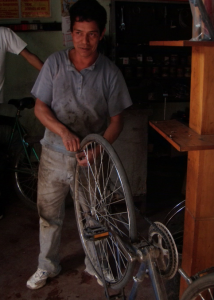 A consignment of bicycles from FIDESMA transformed his small itinerant subsistence into a steady and relevant business. The bicycle sales and repair keep Don Max and his family quite busy. The bikes themselves are a lifeline for the many other people in the area who continue to work in the groves. These days, he buys one dozen or so at a time, coming in to San Andrés twice during each container sale, looking for the much-prized and quite necessary mountain bikes. During any given day, Don Max may see numbers of clients coming in for more bikes and equipment such as new chains, spokes, and patches for tires. It is no easy feat to climb these hills; they slope so dangerously that one would expect the groves and gardens planted on them to simply slide down into a heap at the bottom. The travel is time-consuming on foot and the roads are nothing more than wide paths lacking maintenance. The road bikes that initially came to Don’s shop almost 27 years ago were still better than no wheels, but the influx of mountain bikes and their all-terrain wheels is what really turned this area into a “bicycle city” and created a demand for more bikes and an opportunity for new businesses to develop.
A consignment of bicycles from FIDESMA transformed his small itinerant subsistence into a steady and relevant business. The bicycle sales and repair keep Don Max and his family quite busy. The bikes themselves are a lifeline for the many other people in the area who continue to work in the groves. These days, he buys one dozen or so at a time, coming in to San Andrés twice during each container sale, looking for the much-prized and quite necessary mountain bikes. During any given day, Don Max may see numbers of clients coming in for more bikes and equipment such as new chains, spokes, and patches for tires. It is no easy feat to climb these hills; they slope so dangerously that one would expect the groves and gardens planted on them to simply slide down into a heap at the bottom. The travel is time-consuming on foot and the roads are nothing more than wide paths lacking maintenance. The road bikes that initially came to Don’s shop almost 27 years ago were still better than no wheels, but the influx of mountain bikes and their all-terrain wheels is what really turned this area into a “bicycle city” and created a demand for more bikes and an opportunity for new businesses to develop.
Opening up a new program—the potential of making some substantial change for the good—is always very exciting. Last May we loaded our first container to the Vinh Long Union of Friendship. ViUFO has three branches in the rural delta and other rural areas of south west Vietnam, Vung Liem and Tra On which are in Vinh Long province and Tan Phu which is in Dong Nai province. The program met with great success.
While opening a new program in a new country is exciting, having been successful and now loading the 2nd container is exhilarating. On June 2, 2012, with the financial backing of the Dariu Foundation, based in Switzerland, we are loading our 2nd container for Vietnam. Although Vietnam is almost exactly on the other side of the world, it actually happens to have the least expensive shipping costs of any of our overseas programs.
The successful entry into Vietnam of our container of bicycles is the accomplishment of the dedicated work of Nguyen Van Hanh of the Dariu Foundation. Hanh waded through a myriad of red tape and regulation to secure the import permits. And now we are about to do it again!
A giant thank you to all of the donors of bicycles in late May, your bikes will soon make a long journey to their new home. A similar thank you to all of the collectors, who took the time to take off the pedals and turn the handle bars so that we have the bikes ready to go.
Dave
by Herman Longo
UNITY IN DIVERSITY FOUNDATION (UDF) is a Non-Governmental Organization and Non-Profit Making. Registered under Companies Ordinance (Cap 212) Companies Limited by Guarantee no having a share Capital. Registered on September 28th, 2004. Certificate of Incorporation No 50181. Also we have certificate of Compliance of Non Governmental Organization Registered under Vice President’s Office given at 13th March 2006. Our Registration No is 1597. Was founded for the following reasons. To unify, train and empower financially diverse expertise of idle expertise in different trades for the purpose of running their projects effectively.
OUR VISION. UDF envisages seeing that the idle expertise are unified and empowered.
OUR MISSION. To identify, unify, and offer training in their respective expertise for the purpose of running projects that will contribute towards the increase of the national economy and to procure and manage funds to be provided to the trained grantees for using them in running their projects.
OBJECTIVES. (a) To run educational institutes from grass-root level that is Nursery school, primary school, secondary school, vocational training school, secretarial, business/commercial, tourism etc. (b) To assist the marginalized sectors of the community by providing them with relevant education and information in order to assert their rights and seek improvement of their living conditions with particular emphasis on women, street children, orphans, disabled and HIV/AIDS victims.
THE PROJECT OF BICYCLES. The Bicycles project will help the idle expertise of Tanzania who were walking on foot, transporting goods on their heads, now will be using the bicycles for transportation of agricultural crops from their farms. The bicycles will be used by women and men in productive activities. Also the bicycles will be used by students who are walking 7 kms to 10 kms going to school every day. Also the bicycles will be used by women who are walking 6 kms to 10 km seeking water. The bikes will be doing a lot of activities such as carrying pregnant mothers from the village to town. Where there is no means of transportation the bikes will be carrying sick people and pregnant mothers.
THE PROJECT OF SEWING MACHINES. The sewing machines will be used to empower idle Girls in Tanzania, idle orphans, idle widows, idle women groups, idle youth group who are lacking employment and will be employed by this project. Due to the high movements of girls who are migrating from the villages to town the only solution is to provide them with sewing machines so that to lessen them from engaging into prostitution, drug abuse, unwanted pregnancies, theft, sexual abuses, etc. The sewing machines will provide them with employment for their self sustainability, self reliance and self employment. The sewing machines will help also the people living with HIV/AIDS and women groups who are idle. They will benefit from this project so that they may be encouraged into productive activities for improving the national economy by making different clothes like table cloths for decorating the tables and selling clothes to other nearby countries like Malawi, Zambia, and DRC. The sewing machines will bring a lot of changes soon because we have so many teachers who can teach them. It takes only three to six months for a young lady to master the sewing machine.
Through the Project of Bicycles and Sewing machines the vision of UDF which is to empower the idle expertise will be achieved. Also the vision of MATABE to Make Tanzania Better will be achieved effectively because everyone will busy working and our economy will be improving day after day and there will be no famine, no drug abusers, no prostitution, the kids will be attending the school well, at last everyone will be smiling in this world.
Since a warm November day in 1991, we have shipped a whole lotta bikes to Rivas, Nicaragua. If there were a Rip van Winkle in Rivas, he would awake to a city he could not recognize. Old Rip would have never seen dedicated bicycle lanes along the Pan-American Highway with traffic lights for bicycles to cross the formerly dangerous highway. Bicycle cargo vehicles and bicycle taxis filling the streets with the vibrancy of a bustling economy. At the beginning and end of the school day, a giant torrent of students from all around the surrounding countryside streaming in to Rivas for their daily lessons at school.
Our partner, Ecobicicletas, proudly situated on the north side of the marketplace, is still supplying the community with a constant stream of newly arriving bicycles from New Jersey.
A lot has changed for the good in Rivas since 1991, and 21,000+ P4P bikes helped make that change happen. Check out the great trailer of this upcoming documentary, The Bicycle City (TheBicycleCityFilm.com).